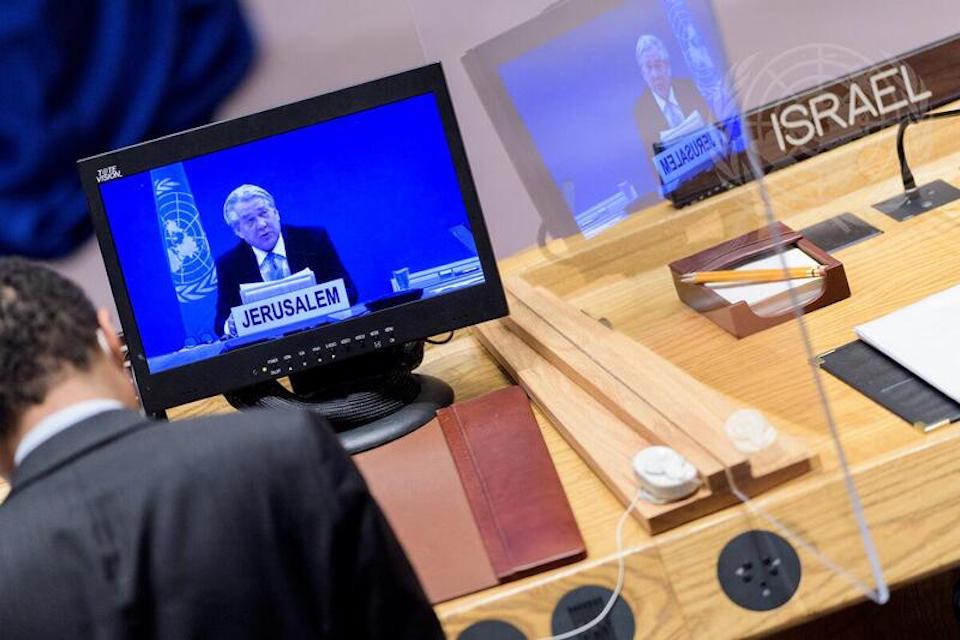Unilateral actions risk undermining engagement between Israeli Government and Palestinian leadership
Statement by Ambassador James Kariuki at the Security Council briefing on the Middle East Peace Process

Thank you Madam President.
Before I start I’d like to stress, as my Foreign Secretary has said, the United Kingdom condemns in the strongest terms the terrorist attacks of 17 January, claimed by the Houthis against civilian sites in Abu Dhabi. We extend our condolences to the victims and their families.
Turning to the topic of today’s discussion, my thanks to the Special Coordinator for his briefing. I’d like also to thank our two briefers from EcoPeace. You have demonstrated today how climate and environmental impacts can be both a source of insecurity but also a driver of cooperation between communities. The United Kingdom supports your call for greater regional cooperation on joint environmental threats. The solar-water agreement between Israel, Jordan and the UAE in November illustrates the value of such efforts.
Madam President, I wanted to pay thanks to Norway for your leadership on economic coordination between the parties. Including chairing, in November, the first in-person Ad Hoc Liaison Committee in two years. Both parties committed there to enhancing dialogue and expressed a willingness to reinvigorate the long-stalled Joint Economic Committee. The UK calls on both parties to advance these goals as we approach the next Ad Hoc Liaison Committee this coming March.
The UK welcomes continued engagement between the Government of Israel and the Palestinian Authority, including direct meetings between Defence Minister Gantz and President Abbas, and discussions between the Ministries of Finance aimed at improving the economic conditions in the Occupied Palestinian Territories.
Such direct engagement is vital given the scale of the current challenges. We urge Israel and the PA to accelerate efforts to improve the financial situation and the economic and humanitarian conditions in the West Bank and Gaza. We welcome the appointment of new Palestinian Ministers of the Interior and Awqaf and continue to urge the Palestinian Authority to deliver reforms towards greater accountability, transparency and efficacy.
Madam President, on 17 January British diplomats witnessed the attempted eviction of the Salhia family who live and run a business in Sheikh Jarrah. Earlier this morning authorities returned to demolish their home and arrested members of the family. We again urge the Government of Israel to cease such policies. Evictions are against international humanitarian law in all but the most exceptional circumstances, and cause unnecessary suffering.
Also on 17 January, as we have heard, approval was given to the ‘lower aqueduct’ settlement plan representing nearly 1,500 housing units, some of which fall outside the Green Line, and to be built between Givat Hamatos and Har Homa. Madam President, we urge the Government of Israel to permanently end its settlement expansion and settlement activity, which heightens tension and threatens the viability of a future Palestinian state.
The UK condemns the attempted stabbing attack on an IDF solider in the West Bank on 17 January. This incident follows several attacks on Israeli civilians and soldiers at the end of last year. We call for the parties to work together to condemn violence and minimise tension.
Stability in Gaza remains a focus for the UK. We condemn the firing of missiles from Gaza towards Israel at the start of January and we urge all sides to work to sustain the calm.
Madam President, we urge both parties to avoid unilateral actions harmful to peace, which risk undermining the engagement between the Israeli Government and the Palestinian leadership I referred to at the beginning of my statement. We call on both parties to work together to create the foundations for future progress towards a two-state solution.